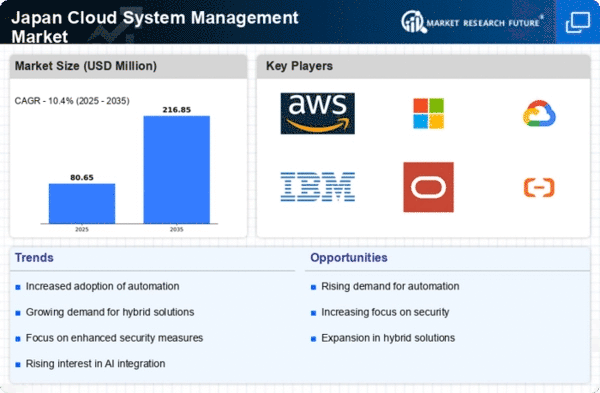Rising Demand for Scalability
The The Japan cloud system-management market experiences a notable surge in demand for scalable solutions. As businesses increasingly seek to adapt to fluctuating workloads, the ability to scale resources efficiently becomes paramount. This trend is particularly evident in sectors such as e-commerce and finance, where peak periods necessitate rapid resource allocation. According to recent data, approximately 70% of Japanese enterprises prioritize scalability in their cloud strategies. This growing emphasis on flexible resource management is likely to drive innovation within the cloud system-management market, as providers develop solutions that can seamlessly adjust to varying demands. Furthermore, the integration of advanced analytics tools may enhance the ability to predict resource needs, thereby optimizing operational efficiency. Consequently, the pursuit of scalability is a critical driver shaping the future landscape of the cloud system-management market in Japan.
Increased Focus on Cost Efficiency
Cost efficiency remains a pivotal concern for organizations in Japan, significantly influencing the cloud system-management market. As companies strive to optimize their IT budgets, the shift from traditional on-premises infrastructure to cloud-based solutions appears to offer substantial savings. Recent studies indicate that businesses can reduce operational costs by up to 30% through effective cloud management strategies. This financial incentive encourages organizations to adopt cloud solutions that not only streamline operations but also minimize capital expenditures. Moreover, the competitive landscape compels cloud service providers to offer cost-effective pricing models, further driving adoption. As a result, the focus on cost efficiency is likely to propel growth within the cloud system-management market, as more enterprises recognize the financial benefits of transitioning to cloud-based infrastructures.
Emergence of Multi-Cloud Strategies
The adoption of multi-cloud strategies is becoming increasingly prevalent among Japanese enterprises, significantly impacting the cloud system-management market. Organizations are recognizing the benefits of leveraging multiple cloud providers to enhance flexibility, avoid vendor lock-in, and optimize performance. Recent surveys indicate that over 50% of Japanese companies are currently utilizing a multi-cloud approach, reflecting a shift towards diversified cloud environments. This trend necessitates advanced management solutions that can seamlessly integrate and orchestrate resources across various platforms. Consequently, cloud service providers are likely to innovate their offerings to support multi-cloud environments, thereby enhancing their competitive edge. The emergence of multi-cloud strategies is poised to reshape the cloud system-management market, as businesses seek to maximize the advantages of diverse cloud ecosystems.
Growing Regulatory Compliance Requirements
The The Japan cloud system-management market is increasingly shaped by stringent regulatory compliance requirements. With the rise of data protection laws, such as the Act on the Protection of Personal Information (APPI), organizations are compelled to ensure that their cloud solutions adhere to these regulations. This compliance imperative drives demand for cloud management tools that facilitate data governance and security. Approximately 60% of Japanese companies report that compliance concerns significantly influence their cloud strategy decisions. As a result, cloud service providers are likely to enhance their offerings to include robust compliance features, thereby positioning themselves favorably in the market. This growing emphasis on regulatory adherence not only impacts the operational strategies of businesses but also serves as a catalyst for innovation within the cloud system-management market.
Technological Advancements in Cloud Solutions
Technological advancements play a crucial role in shaping the cloud system-management market in Japan. Innovations such as containerization, serverless computing, and edge computing are transforming how organizations deploy and manage cloud resources. These technologies enable businesses to enhance operational efficiency and improve application performance. For instance, the adoption of container orchestration tools has increased by approximately 40% among Japanese enterprises, indicating a strong interest in modernizing cloud infrastructures. As organizations seek to leverage these advancements, cloud service providers are likely to invest in developing cutting-edge solutions that cater to evolving market demands. This continuous evolution of technology within the cloud system-management market is expected to drive growth and foster a competitive landscape, as companies strive to stay ahead in the digital transformation journey.

















Leave a Comment